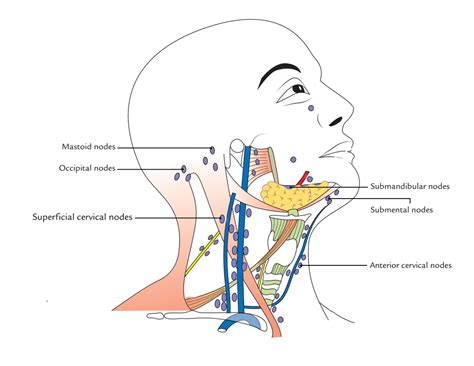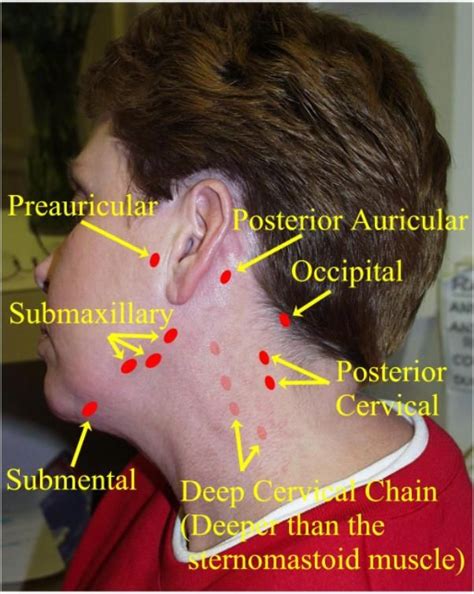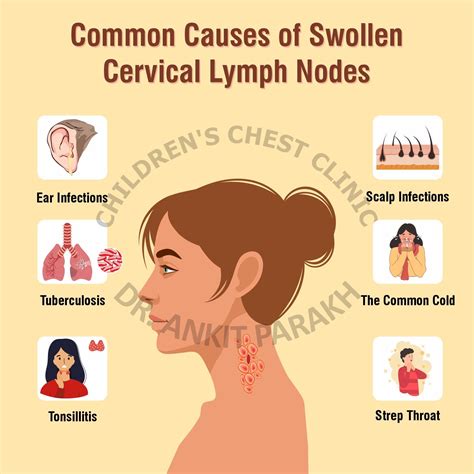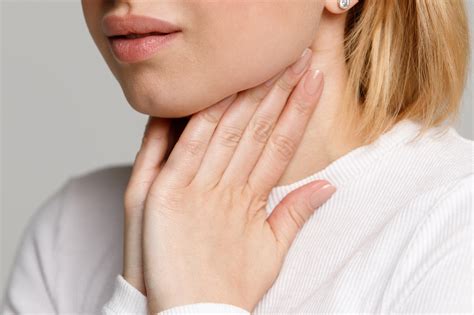Intro
Discover the role of neck lymph nodes in immune function, swollen lymph nodes causes, and lymph node cancer symptoms, exploring diagnosis and treatment options for optimal health and wellness.
The human body is a complex system, and one of its essential components is the lymphatic system. The lymphatic system plays a crucial role in protecting the body against infections and diseases. A vital part of this system is the lymph nodes, which are small, bean-shaped structures that help filter out harmful substances from the body. Among the various lymph nodes present in the body, the neck lymph nodes are of particular importance. They are responsible for draining lymph fluid from the head, neck, and face, making them a key indicator of the body's overall health.
The neck lymph nodes are located in the neck region, and their primary function is to act as a filter, removing bacteria, viruses, and other foreign substances from the lymph fluid. This process helps prevent the spread of infection to other parts of the body. The neck lymph nodes are also responsible for storing lymphocytes, a type of white blood cell that plays a vital role in the immune system. When the body detects an infection or disease, the lymph nodes become swollen as they work to fight off the invading organisms. This swelling can be a sign of an underlying health issue, making it essential to understand the functions and significance of the neck lymph nodes.
Understanding the neck lymph nodes is crucial for maintaining overall health and well-being. By recognizing the importance of these lymph nodes, individuals can take proactive steps to protect their health and prevent potential problems. In this article, we will delve into the world of neck lymph nodes, exploring their functions, locations, and significance. We will also discuss the common causes of swollen neck lymph nodes, symptoms, and treatment options. Whether you are a healthcare professional or simply interested in learning more about the human body, this article aims to provide a comprehensive overview of the neck lymph nodes and their role in maintaining optimal health.
Introduction to Neck Lymph Nodes

Functions of Neck Lymph Nodes
The primary functions of the neck lymph nodes include: * Filtering out harmful substances from the lymph fluid * Storing lymphocytes, which are essential for fighting off infections * Activating lymphocytes to respond to infections or diseases * Removing bacteria, viruses, and other foreign substances from the lymph fluid * Helping to prevent the spread of infection to other parts of the bodyLocations of Neck Lymph Nodes

Causes of Swollen Neck Lymph Nodes
Swollen neck lymph nodes can be caused by a variety of factors, including: * Infections, such as the common cold or flu * Bacterial infections, such as strep throat or tuberculosis * Viral infections, such as mononucleosis or HIV * Cancer, such as lymphoma or leukemia * Autoimmune disorders, such as rheumatoid arthritis or lupus * Injuries or trauma to the neck or headSymptoms of Swollen Neck Lymph Nodes

Treatment Options for Swollen Neck Lymph Nodes
The treatment options for swollen neck lymph nodes depend on the underlying cause, but common treatments include: * Antibiotics for bacterial infections * Antiviral medications for viral infections * Pain relief medications for pain and discomfort * Surgery or radiation therapy for cancer * Immunosuppressive medications for autoimmune disorders * Rest and hydration for viral infectionsDiagnosing Swollen Neck Lymph Nodes

Preventing Swollen Neck Lymph Nodes
Preventing swollen neck lymph nodes involves maintaining a healthy lifestyle, including: * Practicing good hygiene, such as washing hands regularly * Getting vaccinated against infectious diseases * Avoiding close contact with people who are sick * Eating a balanced diet rich in fruits, vegetables, and whole grains * Getting regular exercise and maintaining a healthy weight * Managing stress and getting enough sleepConclusion and Final Thoughts

What are the common causes of swollen neck lymph nodes?
+The common causes of swollen neck lymph nodes include infections, bacterial infections, viral infections, cancer, autoimmune disorders, and injuries or trauma to the neck or head.
How are swollen neck lymph nodes diagnosed?
+Diagnosing swollen neck lymph nodes typically involves a physical examination, medical history, and diagnostic tests, such as blood tests, imaging tests, biopsy, and lymph node aspiration.
What are the treatment options for swollen neck lymph nodes?
+The treatment options for swollen neck lymph nodes depend on the underlying cause, but common treatments include antibiotics, antiviral medications, pain relief medications, surgery or radiation therapy, and immunosuppressive medications.
How can I prevent swollen neck lymph nodes?
+Preventing swollen neck lymph nodes involves maintaining a healthy lifestyle, including practicing good hygiene, getting vaccinated, avoiding close contact with people who are sick, eating a balanced diet, getting regular exercise, and managing stress.
What are the symptoms of swollen neck lymph nodes?
+The symptoms of swollen neck lymph nodes can vary depending on the underlying cause, but common symptoms include swelling or enlargement of the lymph nodes, pain or tenderness in the neck or head, fever or chills, sore throat or difficulty swallowing, fatigue or weakness, and weight loss or loss of appetite.
We hope this article has provided you with a comprehensive understanding of the neck lymph nodes and their significance in maintaining overall health and well-being. If you have any further questions or concerns, please do not hesitate to reach out to a healthcare professional. Remember to share this article with others who may benefit from this information, and let's work together to promote healthy living and disease prevention.
